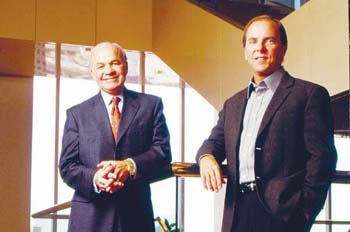![[Metroactive Movies]](/movies/gifs/movies468.gif)
[ Movies Index | Show Times | Silicon Valley | Metroactive Home | Archives ]
Masterminds: Enron's Ken Lay (left) and Jeffrey Skilling jobbed the system, investors and rate payers for billions.
Scam Artists
'Enron: The Smartest Guys in the Room' details the many creative ways
we got shafted
By Richard von Busack
THERE MAY not be much news in Enron: The Smartest Guys in the Room, at least for a well-read cable-TV watcher who knows the pieces of the scandal. Many are looking forward to Jan. 17, 2006—the trial dates for "Kenny Boy" Lay and Jeff Skilling—in the same way that they might await a new season of The Sopranos.
Bethany McLean and Peter Elkind's book, on which this documentary is based, outlines the vastness of Enron's scam. But for those who had only the vaguest idea of how Enron did it, Alex Gibney's film is an infuriating study of the largest corporate bankruptcy in America's history.
He chronicles the fleeced investors, the greased palms and the baffling accounting. Under cover of darkness, Enron's bean counters inflated stocks and denuded 401k's, while hiding losses with the help of Star Wars-themed phantom companies.
Enron's thugs extorted $30 billion from California: a yentzing worthy of the Gilded Age. When the smoke cleared, thousands were unemployed, though the execs had helped themselves to what money that remained. And the ground was laid for Schwarzenegger's coup.
Gibney loads the film with Tom Waits music; the first sight of Enron's mirror-wrapped twin towers is accompanied by "What's He Building?" The director tours the abandoned trading hall, noting its ceiling, with its spiral array of acoustical tiles. (That geometrical figure should have told visitors something: it suggested the labyrinthine nature of Enron's financing.)
Above the trading floor was the aerie of the two executives who gave this documentary its name. Ken Lay was a Baptist preacher's son and a self-made man; the considerably more wrathful Jeff Skilling, an overcompensating macho ex-nerd. Their disciples included CFO Andrew Fastow, creator of the chimerical LJM private equity fund, and Tim Belden, architect of the California power shortages.
The story begins in earnest with the Jan. 25, 2002, suicide of exec John C. Baxter. Baxter was the only Enronite who had enough sense of honor to kill himself. Moving backward, Gibney shows how Enron created the energy-brokering business.
During the 1990s it expanded its holdings to include everything from Nigerian power barges, a power plant in Maharashtra, India, and a movies-on-demand subsidiary. None of these enterprises were profitable, but that meant nothing to the ever-rising stock values.
Readers of business news required snorkels to make it through the waves of drool inundating the pages of Business Week and the Wall Street Journal. "What's not to like?" wrote one star-struck hack.
One secret of the Enron illusion was "mark-to-market," an accounting system that put down projected earnings as actual assets. We see Skilling acting in an in-house video skit, promising an investor "kazillions" if she invests in Enron stock, in the manner of a fox talking to a hen. The video is one homely moment in the history of a company known for its dick wielding and throat cutting. Like a boiler-room brokerage, it was expected that 15 percent of
the employees a year would get kicked out.
What's not to like about this documentary? Gibney streamlines the various scams, orders them intelligently and conducts telling and touching interviews throughout. The clips from vintage documentaries and the guest appearance by Homer J. Simpson offer relief from all the smug aging-frat-boy faces.
Still, there needs to be a boycott on super-slow-motion footage of Dick Cheney walking down a hall. This gambit needs to be returned at once to TV's Hard Copy. Another problem is Gibney's lionization of ex-Gov. Gray Davis. There must be a mathematical law that predicts how much more charismatic a politician becomes in relation to the amount of time since he has left office. One has to guffaw when the director suggests that Davis, the Yuri Andropov of governors, could have been president if it weren't for Enron.
To be fair, Davis was dealt a bad hand. As we remember, it served Davis little to complain to Bush the Younger, who had been an Enron sweetheart since his youth, just like his father.
Nothing in the film is as infuriating as listening to the two anonymous traders on the phone, gloating over California's suffering. "Burn, baby, burn," chortles one, when wildfires decreased the power supply and added to Enron's bankroll. As a Californian, I'd love to take a baseball bat to these jackals; fortunately, as a Californian I'm a great believer in the superior bludgeoning power of karma.
Happily, the trials are coming up. We have happy footage of Lay and Skilling doing the perp walk, as well as Gibney's superior outline to refresh the memory of how the mess began and endured.
[ Silicon Valley | Metroactive Home | Archives ]
![]()

Photograph by Wyatt McSpadden
Enron: The Smartest Guys in the Room (Unrated; 109 min.), a documentary by Alex Gibney, opens Friday at selected theaters.
Send a letter to the editor about this story to letters@metronews.com.
From the April 27-May 3, 2005 issue of Metro, Silicon Valley's Weekly Newspaper.